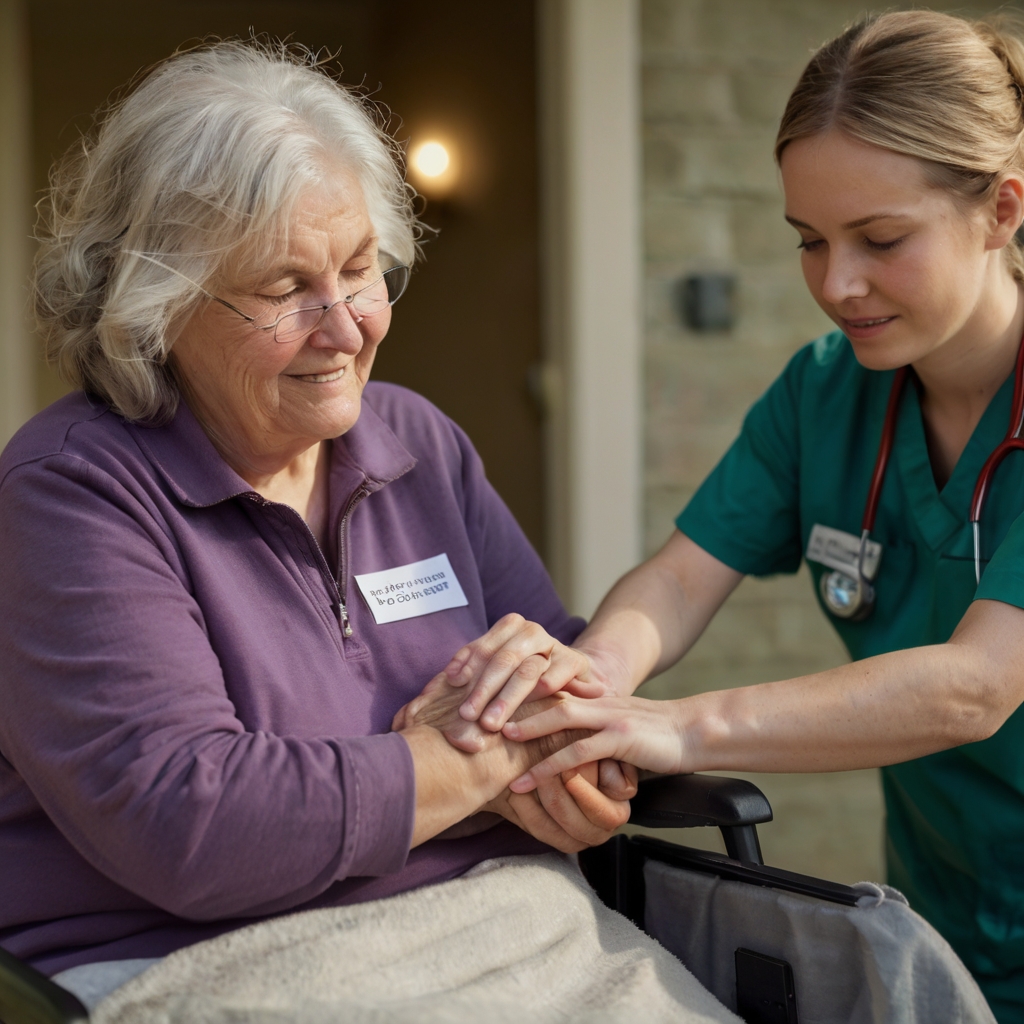Hospice Volunteer Opportunities Near Me

Helping someone in their final days is one of the most meaningful ways to serve your community. Local hospice volunteers provide vital support to patients, families, and healthcare professionals. This role offers remarkable personal growth and lets you bring comfort to those who need it most.
Every volunteer role creates positive changes throughout the community. You might help with direct patient care, family support, or administrative work. Your steadfast dedication strengthens compassionate care and builds deep human connections. Local hospice organizations welcome people who want to share their time and talents. Anyone with a caring heart and desire to learn can join this noble work.
Many hospice volunteer roles near you can match your skills and schedule. This piece explains everything about hospice volunteering, from available positions in Miami-Dade County to training requirements and responsibilities. You can help with direct patient care or administrative support by connecting with local hospice organizations to make a difference.

Table of Contents
- 1 More About Hospice Volunteering
- 2 Some of The Types of Hospice Volunteer Opportunities
- 3 How to Find Hospice Volunteer Opportunities Near You
- 4 Requirements and Training for Hospice Volunteers
- 5 Here are some FAQs about these volunteer opportunities:
- 5.1 How do I volunteer for local hospice care?
- 5.2 What do I need to know before volunteering at a hospice?
- 5.3 Why do I want to volunteer at a hospice?
- 5.4 What do you say as a hospice volunteer?
- 5.5 How do I volunteer at my local hospital?
- 5.6 Can I volunteer at a local nursing home?
- 5.7 How do I get someone in hospice?
- 5.8 What questions are asked in a hospice volunteer interview?
- 5.9 What do palliative volunteers do?
- 5.10 What did I learn from being a hospice volunteer?
- 5.11 How do you nail a volunteer interview?
- 5.12 What should I wear to a hospice interview?
- 5.13 What are good hospice questions?
More About Hospice Volunteering
Exploring hospice volunteer opportunities in your area helps you understand the foundations of this meaningful service. Hospice care takes a comprehensive approach to end-of-life support that prioritizes comfort and dignity over curative treatment. The fundamentals of hospice care will guide your decision to begin a journey as a volunteer team member.
What is hospice care?
Hospice care offers special support if you have a life expectancy of six months or less. This care celebrates life until the very end and goes beyond just medical treatment. The care team manages symptoms and ensures quality of life for patients in their chosen home environment – whether that’s their house, a nursing facility, or an assisted living center.
Your nearby hospice organization delivers detailed care through a complete team of professionals who look after physical, emotional, and spiritual needs. The team stays available round the clock to support patients and helps family members and caregivers through this journey.
The role of volunteers in hospice
Volunteers are vital members of the hospice care team. Medicare regulations require hospices to include trained volunteers in their services. Here’s how volunteers make a difference in hospice care:
- Direct Patient Support: They spend time with patients by providing companionship, reading books, or just being there when needed
- Family Assistance: They give family caregivers much-needed breaks through respite care
- Administrative Help: They keep office operations running smoothly and help with fundraising and community outreach
- Specialized Services: They share their unique talents through music performances or pet therapy sessions
Benefits of volunteering in hospice
Hospice volunteering provides rewards that are way beyond the reach and influence of your expectations. Research shows improved mental and physical health along with increased life satisfaction among hospice volunteers. You’ll gain valuable life experience and develop deeper empathy. These skills are especially helpful if you plan to pursue a career in healthcare or social work.
This role creates profound personal growth opportunities. The meaningful relationships you build with patients and fellow caregivers can last a lifetime. Most volunteers say they receive more than they give and find purpose by supporting others during their final experience.
Your service as a hospice volunteer in Miami-Dade County or your local community helps boost patient satisfaction levels. The volunteer coordinator matches your skills and interests with the right opportunities. This ensures a rewarding experience for you and the patients you serve.
Some of The Types of Hospice Volunteer Opportunities
Your local hospice organizations have a variety of volunteer opportunities that align with your talents and passions. You can make a meaningful difference in your community by dedicating just a few hours each week or month.
Direct patient care roles
A direct care volunteer creates meaningful connections with patients by providing companionship and emotional support. You can brighten a patient’s day through several simple yet impactful activities:
- Reading their favorite books or daily newspapers
- Playing enjoyable board games or card games
- Capturing their life stories and precious memories
- Having heartfelt conversations or sharing peaceful quiet moments
- Joining them in light activities like gardening or creative crafts
These special moments of connection become cherished memories that touch both your life and your patient’s heart.
Family support roles
Family caregiver support is a vital part of hospice volunteering. A family support volunteer helps families care for their loved ones. You can provide respite care that allows family members to take much-needed breaks, run errands, or handle personal matters. You might help with basic household tasks or look after young children to keep the household running smoothly during difficult times.
Administrative and fundraising roles
Dedicated volunteers keep every successful hospice program’s operations running smoothly. Miami-Dade County hospices need administrative volunteers to support essential organizational functions. Your role could include data entry, preparing mailings, or answering phones. Fundraising volunteers make a significant impact by organizing events that range from annual galas to community awareness campaigns. These efforts help ensure hospice services remain accessible to all who need them.
Specialized skills volunteering
Your unique talents can bring extra comfort and joy to hospice patients. Specialized volunteers share their professional and personal skills to create meaningful experiences. Licensed beauticians offer haircuts and styling services, musicians play soothing melodies, and certified pet therapy teams provide comfort through animal companionship. Bilingual volunteers play a vital role in a variety of communities and help bridge communication gaps between patients and care teams.
A volunteer coordinator in your area will help match your skills and interests with the perfect role. Your contribution will create lasting positive changes in your local hospice community, whether you prefer direct patient care or supporting operations behind the scenes.
How to Find Hospice Volunteer Opportunities Near You
Ready to begin your trip as a hospice volunteer? Finding the right chance in your area is easier than you might think, and we’ll show you the best ways to connect with hospice organizations in your community.
Online resources and databases
Technology and the digital world have made hospice volunteer opportunities more available than ever before. These reliable online platforms can help you start your search:
- VolunteerMatch: A complete database that connects volunteers with local hospices
- Points of Light: National network with many hospice opportunities
- Get Connected: Local volunteer platform
- Hospice Volunteer Association: Specialized database dedicated to hospice volunteering
You can find opportunities by entering your location and “hospice volunteer” in the search field. Organizations in Miami-Dade County and nearby areas post their opportunities through these channels regularly.
Contacting local hospice organizations
Local hospices provide excellent volunteer opportunities. Here’s how you can get started:
- Search for hospices in your vicinity
- Visit their websites to learn about volunteer programs
- Contact their volunteer coordinator directly
- Ask about specific current needs
- Ask about upcoming orientation sessions
Hospice organizations understand your schedule and offer flexible timing options. Their volunteer coordinators make the process convenient with weekend or evening orientation sessions that work around your schedule.
Volunteer matching services
The Volunteer Referral Network (VRN) helps match potential volunteers with local hospice programs. This free service makes the process easier and automatically alerts volunteer coordinators about your interest. Your preparation should include:
- Complete contact details
- Preferred volunteer activities
- Schedule flexibility
- Background and expertise
Community outreach programs
Hospice programs build mutually beneficial alliances with local community centers and religious organizations to find volunteers. These connections help create a strong support network in your neighborhood. You can find volunteer opportunities through these community channels:
- Educational institutions: Many colleges and universities, especially those with medical programs, maintain relationships with local hospices
- Community centers: Often host volunteer fairs and information sessions
- Religious organizations: Frequently coordinate with hospice volunteer programs
- Healthcare facilities: May have information about affiliated hospice programs
Most hospices need background checks and specific training before you start volunteering. This process will give a safe environment for both volunteers and patients while preparing you for this meaningful role. Organizations usually cover background check costs and offer complete training programs to help you succeed in your volunteer work.
Feel free to ask questions about specific needs when you contact hospices in your area. They can help match your skills to serve their community better. A hospice program near you would welcome your steadfast dedication to helping others during their final days, whether you live in Miami-Dade County or elsewhere.

Requirements and Training for Hospice Volunteers
Understanding the requirements and training process will help you prepare effectively before you begin your hospice volunteer experience. Hospice organizations maintain high standards that ensure excellent care for patients and their families.
Age and background check requirements
The journey to become a hospice volunteer starts when you meet basic requirements. Most hospices review volunteers based on their emotional maturity and knowing how to handle end-of-life situations, though Medicare and accrediting organizations haven’t set specific minimum age requirements.
A criminal background check remains mandatory for hospice volunteers who interact with patients directly or access patient records. The background check must align with your state’s specific requirements where applicable. States without specific guidelines require checks to be completed within three months of starting service. These checks must cover every state where you’ve lived or worked during the previous three years.
Skills and Qualities You Need
Great hospice volunteers share qualities that make them exceptional caregivers. Your volunteer coordinator wants to see these traits in you:
- Commitment: Shows up for weekly visits and keeps promises
- Emotional maturity: Understands the grief process and maintains healthy boundaries
- Communication skills: Listens well and adapts to different situations
- Cultural sensitivity: Values beliefs, traditions, and priorities of others
- Reliability: Shows up consistently and handles responsibilities well
Training programs and orientation
Most hospice volunteers start with a detailed orientation program. Federal regulations don’t specify required hours, but hospice centers in Miami-Dade County and nationwide follow industry standards of 16-20 hours of training. You will experience:
- Initial screening and interview with the volunteer coordinator
- Core training modules covering hospice philosophy and patient care
- Specialized instruction based on your chosen volunteer role
- Competency assessment to ensure readiness
- Shadowing experiences with experienced volunteers
The training program has these key topics:
- Hospice goals, services, and philosophy
- Confidentiality and HIPAA requirements
- Family dynamics and psychological aspects of terminal illness
- Emergency procedures and safety protocols
- Documentation requirements and reporting structures
Ongoing support and education
A hospice volunteer’s growth continues beyond the original training. Each hospice provides continuous support and education that helps volunteers feel confident and prepared in their roles. Non-direct care volunteers must complete 8 hours of annual education, and direct patient care volunteers need 12 hours.
The volunteer coordinator becomes your main contact and provides guidance throughout your experience. They help you find resources, address your questions, and offer regular supervision to ensure your comfort in the role.
Regular in-service training sessions help you stay current with best practices and new developments in hospice care. These sessions cover:
- Advanced communication techniques
- Updates on safety protocols
- Specialized skills training
- Self-care and boundary maintenance
- Cultural competency improvement
Your hospice organization documents all training and keeps records of your volunteer hours. This ensures compliance with Medicare requirements that volunteer hours must equal at least 5% of total patient care hours.
These requirements prepare you for the profound responsibility of supporting patients and their families during their hospice experience. Your training investment reflects your vital role in providing compassionate end-of-life care to your community.
Hospice volunteering is one of the most meaningful ways to serve your community. You’ll find several ways to make a difference in end-of-life care. Your trip as a hospice volunteer helps patients and families while supporting crucial healthcare services in your community. Hospice organizations provide complete training programs and continuous support that give you the tools to impact others’ lives.
Here are some FAQs about these volunteer opportunities:
How do I volunteer for local hospice care?
To volunteer for local hospice care, start by searching for “hospice volunteer opportunities near me” to find facilities looking for volunteers. Many hospice programs have online applications or contact information for volunteer coordinators. You’ll likely need to complete an orientation, background check, and training on hospice care protocols and support techniques.
What do I need to know before volunteering at a hospice?
Before volunteering at a hospice, it’s important to understand that it involves supporting individuals at the end of life, which can be emotionally intense. Training will prepare you to provide comfort and companionship in a sensitive environment. A background in care is not necessary, but compassion, empathy, and respect for patients’ and families’ experiences are essential.
Why do I want to volunteer at a hospice?
Volunteering at a hospice offers a unique opportunity to provide comfort to individuals and families during one of life’s most challenging times. Many people choose to volunteer to give back to their community, make a positive impact, or find a deeper understanding of life’s values. Searching “volunteer hospice near me” can connect you with the right opportunities.
What do you say as a hospice volunteer?
As a hospice volunteer, simple, kind, and open-ended statements can bring comfort to patients. Listening attentively and offering words of empathy are key. Avoid using phrases that dismiss their feelings; instead, saying “I’m here for you” or “Is there anything you’d like to talk about?” can provide more comfort.
How do I volunteer at my local hospital?
To volunteer at a local hospital, look up “volunteer at hospice near me” or check the hospital’s website for volunteer programs. Hospitals usually require an application, interview, and background check. Volunteers often receive training for specific roles in patient support or administration, depending on the hospital’s needs.
Can I volunteer at a local nursing home?
Yes, many nursing homes offer volunteer opportunities similar to hospice care. Search “hospice near me volunteer” for local listings, or contact nearby nursing homes directly. Volunteering in these settings often involves social engagement, activity assistance, or companionship roles with residents.
How do I get someone in hospice?
To get someone into hospice care, consult with their doctor to assess eligibility, which usually includes a terminal diagnosis with a prognosis of six months or less. Once eligibility is determined, reach out to local facilities, using search terms like “hospice volunteer near me,” to find options.
What questions are asked in a hospice volunteer interview?
A hospice volunteer interview may include questions about your motivations, past experiences, and comfort level around end-of-life care. You might be asked why you’re interested in “volunteer hospice near me” opportunities and how you handle emotionally challenging situations.
What do palliative volunteers do?
Palliative volunteers offer comfort and companionship to patients, providing emotional support without clinical care. They may engage patients in conversation, play music, or assist with light activities to help ease discomfort. Volunteering in a palliative setting is often part of hospice programs and can be found by searching “hospice volunteer opportunities near me.”
What did I learn from being a hospice volunteer?
Hospice volunteering teaches empathy, patience, and the importance of being present. Many volunteers find a greater appreciation for life and a deeper understanding of compassion. If you’re considering this work, search “hospice volunteer near me” to learn firsthand from other volunteers’ experiences.
How do you nail a volunteer interview?
To succeed in a volunteer interview, show compassion, reliability, and an understanding of hospice care’s emotional aspects. Share any personal experiences that inspired you to volunteer at hospice near you. Emphasize your commitment and willingness to support patients respectfully.
What should I wear to a hospice interview?
For a hospice volunteer interview, wear clean, professional, and comfortable attire, such as business-casual clothing. Presenting yourself well shows respect for the hospice environment and conveys that you are serious about the role.
What are good hospice questions?
Good hospice questions include inquiries about patient needs, how volunteers support families, and the role volunteers play in daily hospice activities. Asking these questions in your interview shows you are genuinely interested in contributing and can help you decide if volunteering at “hospice near me” is the right fit.

